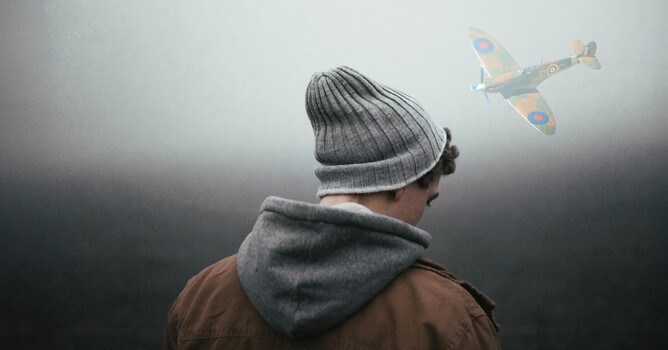For Mikkel*, the end of a relationship led to one of the hardest periods of his life. But with support, reflection and time, it also became a turning point. His story is a reminder that break-ups can be powerful learning experiences, and that recovery isn’t instant, but a journey worth taking.
"I used to go see her and talk to her like an idiot,” laughs Mikkel.
He’s not talking about a friend, family member, or counsellor, but about the WW2 Spitfire near Christchurch Airport, which commemorates New Zealand flyers lost during the Second World War.
While he may not have been fully aware of it at the time, visiting the Spitfire became a quiet ritual, something he could return to that reflected his own struggles and search for peace. There’s a lot in psychology that talks about how people use certain objects or routines to help navigate emotional transitions and feel steadier again.
Months earlier, Mikkel had come out of his second serious relationship — his first was with the mother of his oldest child, and then a second which moved fast and ended painfully. Within a few months of meeting, his second partner was pregnant, and they went on to have two children together. But Mikkel admits now he didn’t understand what a healthy relationship needed to thrive.
“I didn’t realise what a relationship is actually based upon — the mutual respect, the boundaries, the trust and all that kind of stuff,” he says.
When the relationship ended, Mikkel spiralled into a dark period. He stopped working and spent months just staring at the wall. He lost 10-15 kilos, and his thoughts became consumed by feelings of loss and self-doubt.
“There was a time I hardly ate. I had suicidal thoughts. I was in a really bad way.”
Mikkel reached out for help — his GP recommended Kidz Need Dadz, and the organisation became a lifeline. He also sought counselling and began the slow, difficult work of understanding himself.
“It’s a powerhouse of information,” he says of his counselling sessions. “I learnt about why I was attracted to avoidant people, why my relationships kept following the same pattern. I’ve got so much more insight now. I’m looking for something different next time — something built on stronger foundations.”
One of the most powerful shifts came when he stopped drinking.
“I was off work for 4 - 5 months solid. I went into a real bad patch, spiralling with alcohol. I then put a stop to the alcohol, and my whole perspective on everything changed.”
Once Mikkel began to rebuild, he started to recognise how the break-up was affecting his kids and be more present for them. He learnt to respond with greater calm and empathy.
“I’ve learnt how to be more emotionally available to them. I don’t overreact anymore. I stay grounded. I’ve found things we can do together that keep us active — DIY projects, our trips to Bunnings, which I never would have thought they would get so excited about. They're little things they now really look forward to.”
These days he still visits the Spitfire from time to time. There’s a quiet affection in the way he talks about it, a reminder of how far he’s come.
Martin Sloman, an experienced counsellor and co-founder of the men’s mental health charity Whirlwind, sees meaning in Mikkel’s visits to the Spitfire:
“I really liked that Mikkel created a habit of sharing with the Spitfire. It may have represented a metaphor for resilience and overcoming adversity. Talking to something outside of yourself can help you see things more clearly. Our internal dialogue is often distorted or biased, so externalising those thoughts — in this case, to the Spitfire — can offer a more balanced perspective.”
When Mikkel is asked asked what advice he’d give others going through something similar, he doesn’t hesitate:
“Have time to yourself — without alcohol, without dating apps. Do the things you enjoy. Stay around people who keep you centred, like family. Get the help. Get the counselling. Do the work on yourself. The sooner you can move yourself along to a better place, the sooner you can be there for your kids.”
*name changed for confidentiality

